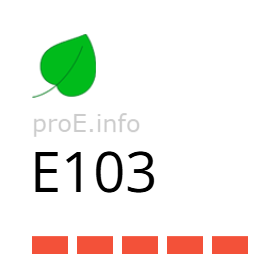
Other names for the additive (synonyms)
General Information
Alkannin, alkanet (food additive E103), is a coloring substance that ranges in hue from golden to burgundy (dark red). It is extracted from the roots of the plant Alkanna tinctoria, which grows primarily in Mediterranean countries.
Alkannin can also be synthesized. The first complete chemical synthesis of alkannin (along with its isomer shikonin) was achieved in 1971 by researchers J. W. Daly and H. H. Seltzman, who published their work in the Journal of Organic Chemistry. The synthesis was complex due to the presence of a chiral center in the molecule. The chemical formula of alkanet is C16H16O5.
Due to the complexity and high cost of synthesis, the production of colorant E103 on an industrial scale relies exclusively on plant root extract.
Food additive E103 is a fat-soluble colorant. Alkannin is stable under normal temperature and pressure. When exposed to strong oxidizing agents, additive E103 breaks down into simpler compounds such as oxides of nitrogen, carbon, and sulfur.
Before 1977, the synthetic azo dye Chrysoine S (Chrysoine resorcinol or Acid Orange 6) with the chemical formula C12H9N2NaO5S was used under the code E103 in Europe. This bright orange dye was banned by Directive 76/399/EEC of the European Council on April 6, 1976.
Chrysoine S and Alkannin are different substances with distinct chemical compositions, origins, and properties. Although both were historically labeled as E103, they are not the same. In modern regulatory documents, the code E103 is no longer used, and both substances are banned for use in food products in many countries.
Effects on the Body
Risks of additive E103
When in contact with the eyes, skin, or mucous membranes, additive E103 causes severe irritation.
The 21st FAO/WHO report on food additives, held in Geneva in 1977, presented the results of extensive studies on Chrysoine (additive E103). Studies conducted on rats and mice between 1955 and 1957 showed that irregular intake of small amounts of alkannin did not produce side effects in animals. However, regular consumption of additive E103 led to the development of cancerous tumors.
For alkannin/alkanet, no scientific data exists confirming toxicity. It appears that alkannin, as additive E103, was excluded from the list of approved additives not due to proven toxicity but rather due to its limited use and insufficient research on its effects on the human body.
Benefits of additive E103
There are currently no scientific data on the health benefits of alkannin or chrysoine. Both additives are banned for use in food products.
Uses
Additive E103 can easily restore the original color of foods lost during processing.
In the food industry, additive E103 has been used as a colorant to give the desired appearance to confectionery and other products.
Alkannin, as a natural colorant, is used in some traditional Indian dishes. For example, the dish "Rogan Josh" is prepared with an extract from Alkanna tinctoria roots known as "Ratan Jot".
In other industries, alkannin is used for coloring oils, ointments, tinctures, and similar products.
Legal Status
Additive E103 did not pass the necessary tests and evaluations and is therefore not approved for use in most European and global markets. Moreover, food additive E103 is banned in many countries due to its potential health risks, including cancer.
In the United States, the FDA removed alkannin from the list of approved color additives back in 1964.
The World Health Organization (WHO) withdrew its authorization for the use of additive E103 (alkannin) in food products in 1978.
Official statement: "The existing specifications were withdrawn. The Committee was not aware of any use of this substance as a food colorant. Because there were no toxicity data, it was not possible to establish an ADI, and no evaluation report was prepared."
In Russia, food additive E103 was removed from the list of “Food additives for food production” in August 2008.
Additive E103 is included in the official list of permitted additives for use in Australia and New Zealand.